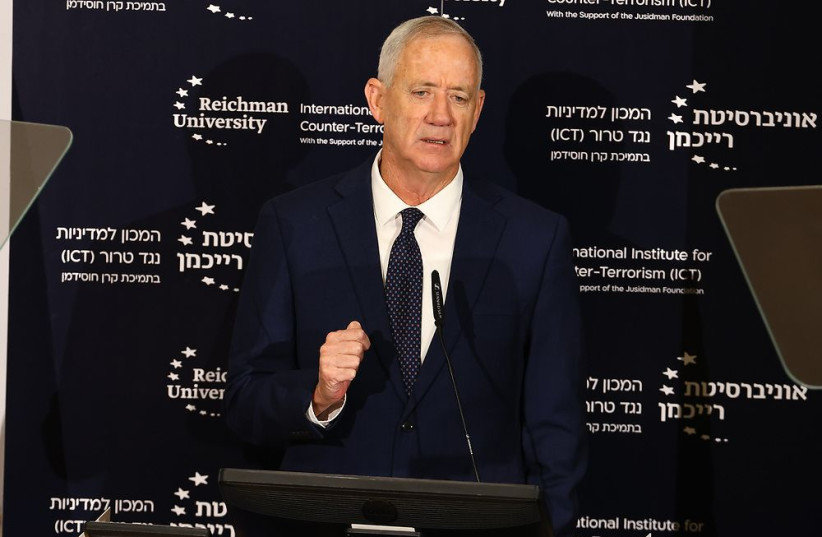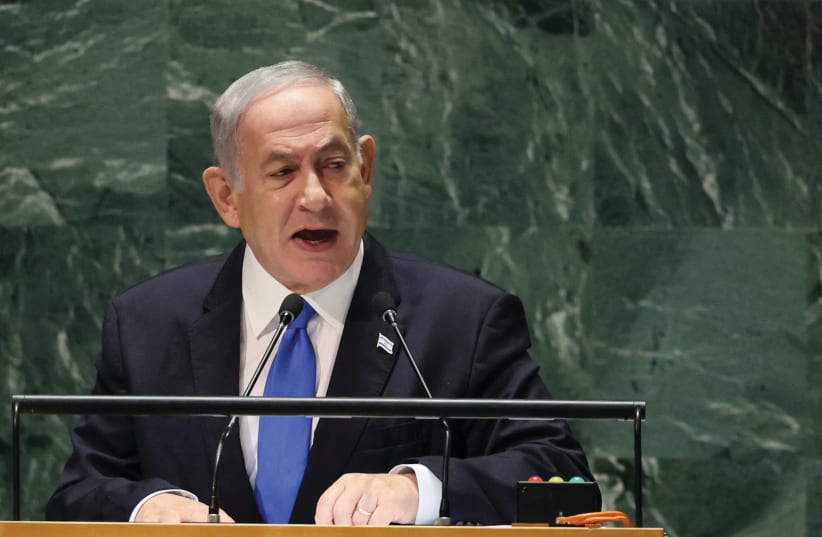The good news is that Prime Minister Benjamin Netanyahu and National Unity Party head Benny Gantz agreed Wednesday to establish an emergency unity government.
The distressing news -- and news that unfortunately reveals much about the political leadership so far during this crisis -- is that it took five days for this government to be established.
Really? Five days? What were they thinking?
With some 1,200 people dead, another estimated 150 people taken hostage, women raped, babies murdered, homes burned and ransacked, entire communities destroyed, 360,000 reservists called up for war, and fear of another front opening in the north, there was something outlandish -- even obscene -- about hearing news reports for days about “coalition negotiations.”
As if these are normal times.


The country is distraught and reeling, and Netanyahu and Gantz are conducting political negotiations. Is this really the time for Netanyahu to worry that agreeing to this type of government could antagonize his coalition partners Itamar Ben-Gvir and Bezalel Smotrich and cost him his 64-seat coalition down the road?
This is not the time for political horse-trading. This is the time for providing leadership.
Unfortunately, that leadership has been slow to appear
The people of Israel have risen to the occasion. You see this everywhere.
You see it in citizens who raced to the killing fields in the south on Saturday to repel the terrorists. You see it in the heroic stories of residents of Kfar Aza, Kerem Shalom, and Ofakim, who took the initiative and fought off the marauders before the army could get there. You see it in the stories of outgunned and surprised soldiers who took back communities that fell into the terrorists’ hands.
You see this in the reservists flying back from abroad to join their units, in one fundraising campaign after the next set up to help the victims, in innumerable citizen initiatives to provide soldiers with food, toothbrushes, underwear, deodorant, and ceramic vests.
But what is striking about much of this is that it was all organic -- it came from the people themselves, from the grassroots. It was not organized from above.
The hand of the government ministries seems to have been largely absent in managing the current crisis.
Ministers who were chattering about everything in front of every microphone just a week ago have suddenly gone quiet. And when they do speak, as National Security Minister Ben-Gvir did , warning of riots in the Arab sector, it is not always helpful.
During a visit to a Sderot police station, Ben-Gvir said he instructed Police Commissioner Kobi Shabtai “to be prepared for a Guardian of the Walls 2 scenario,” referring to Arab riots in the mixed Arab-Jewish towns during the Guardian of the Walls campaign in Gaza in 2021. Senior police sources and coalition ministers reportedly slammed Ben-Gvir for these comments at such a sensitive time, saying they were unsubstantiated.
Where are the Education Minister, the Welfare and Social Affairs Minister, the construction and Housing Minister, the Development of the Negev and Galilee and Natroanl Resilience Minister, and the Public Diplomacy Minister? What are they doing to relieve this crisis of epic proportions and give the nation some confidence, hope, and the sense that someone is at the wheel?
Where, too, is Netanyahu, whose brief appearances before the camera so far during the war have been somewhat anemic and done little to lift the morale of the nation.
Following the unfathomable events of Saturday, the nation needs its morale lifted. Gantz and former Chief of Staff Gadi Eizenkott -- who will be joining the emergency government and will be an observer, along with Strategic Affairs Minister Ron Dermer, in the three-man forum that will have the final say in managing the war -- are not especially known for charisma and are unlikely to raise the nation’s morale through speeches of a Churchillian nature promising blood, toil, tears, and sweat.
But their inclusion in the government and their involvement in the decision-making process may raise the morale of the nation on two counts: by showing that political differences have been temporarily set aside to deal with a much more critical issue, and by giving the country -- or at least that half of the nation that has no trust in the current government -- a sense that there are steadier, more experienced hands on the wheel.
Saturday’s events left many with the horrible feeling that no one is in charge. The establishment of an emergency government may restore some confidence that there is.
